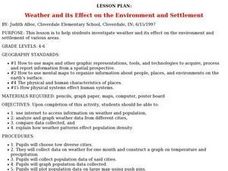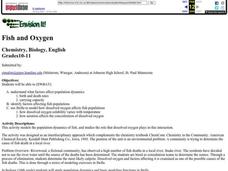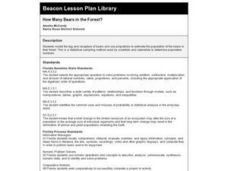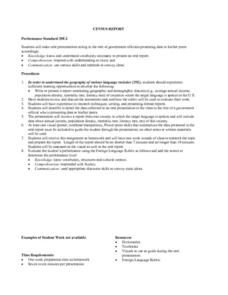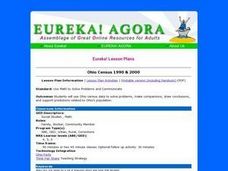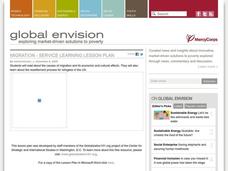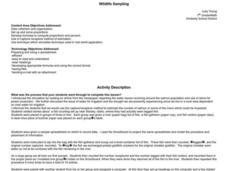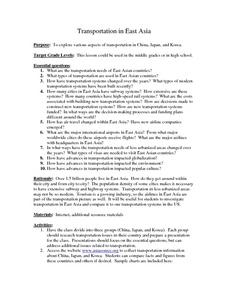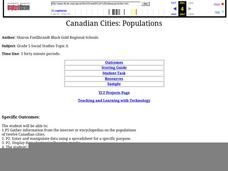Curated OER
Weather and its Effect on the Environment and Settlement
Students, after choosing two diverse cities, collect data on weather for a month and construct a graph on temperature and precipitation. After collecting population data of said cities, and graphing it, they plot population on a large...
Curated OER
Natural Selection Simulation
Students simulate the changes in a natural population of birds or other species. They establish baseline data of population fluctuation for a closed population with a stable food supply. They graph the data to complete their mutations.
Curated OER
Variations
Sttudents examine populations of living things and identify variations in physical features.
Curated OER
Fish and Oxygen
Young scholars explore what factors affect population dynamics, identify factors affecting fish populations, and use Stella to model how dissolved oxygen affects fish populations.
Curated OER
Satellite Images- Night Time
Fourth graders study the geography and population distribution of various places on earth. They utilize actual satellite images of the night sky (lights showing heavily around area of dense population) to study and make observations...
Curated OER
Overpopulation vs. Overuse of Resources
Tenth graders identify the consequences of human population growth. In this biology lesson, 10th graders debate on whether overpopulation or overuse of resources is more harmful to humans. They write a reflection at the end of the...
Curated OER
How Many Bears in the Forest?
Third graders model the tag and recapture of bears and use proportions to estimate the population of the bears in their forest. This is a statistical sampling method used by scientists and naturalists to determine population numbers.
Curated OER
How Much is There to Eat?
Students research population and food consumption rates for different areas of the world.
Curated OER
Census Data and New Hampshire History
Pupils graph the population growth of New Hampshire using historical census data.
Curated OER
Border Math
Students examine and interpret data relating to U.S.-Mexico borderland realities, and consider such aspects of social science as the study of population, crime, government spending, pollution, health, and economics.
Curated OER
Eerie Indiana!
Eleventh graders research the population for ten cities in their state, in this example, Indiana, using census information. They design a spreadsheet using the data and create a bar graph with the data. They complete follow up questions.
Curated OER
Too Many People Coming a Little Too Fast
Students learn what happens when a city's population grows too rapidly for the city to accommodate it. They examine and discuss examples of cities growing rapidly today, what problems occur with rapid growth, and ways to solve these...
Curated OER
Let's Have a Lesson Within a Lesson
Pupils role-play the role of a student who does not comprehend the language the lesson plan is being instructed in. Using the internet, they research the characteristics, distribution and migration of human populations over time. In...
Curated OER
Census Report
Students write and or present a report contrasting geographic and demographic features (e.g., average annual income, population density, mortality rate, literacy rate) of countries where the target languages is spoken to the U.S. They...
Curated OER
How Big is a Crowd?
Sixth graders compare the relative sizes of the five Great Lakes and their human populations. They describe some of the problems that arise when many people depend on a limited resoure. Students discuss how the Great Lakes and the...
Curated OER
Pop Clock
Students explore the Census Bureau's Homepage on the Internet to gather data regarding trends in population, poverty guidelines, and social characteristics between caucasians and minorities. The data is used to investigate evidence for...
Curated OER
Ohio Census 1990 & 2000
Students use Ohio census data to solve problems, make comparisons, draw conclusions, and support predictions related to Ohio's population. They interpret and work with pictures, numbers and symbolic information.
Curated OER
Migration
Students read sections from the Migration Issue Brief concerning why migration happens and the economic and cultural effects of migration. They study about the immigrant population in their own community.
Curated OER
Wildlife Sampling
Seventh graders use paper bags and crackers to simulate a wildlife sampling of salmon. They record data on spreadsheets and determine a formula to estimate salmon populations.
Curated OER
Transportation in East Asia
Students engage in research about the subject of transportation in Eastern Asia. The size of countries and population pose challenges that are studied and reflected upon in student writings from the information found.
Curated OER
Canadian Cities
Fifth graders gather population data on twelve cities in Canada. They present the information on a spreadsheet and sort the data on two different types of graphs. They create a generalization for the data that they collected.
Curated OER
Developing Effective Social Policy for Change
Twelfth graders discuss current suffering, population, and food concerns in a poor area of the world. Next, 12th graders pretend that they are the leader of a country and are concerned about the future of the people. Students work in...
Curated OER
Pond Water Survey
In this survey worksheet students complete a series of short answers to questions on data collection, volume and populations of organisms.
Curated OER
Bat Habitat
Ninth graders engage in a lesson to find the role of bats in the complexity of certain ecosystems. They identify where bats live and the daily role played in the ecosystem. Students also construct a bat house to help control the...
Other popular searches
- Population Ecology
- Population Genetics
- Population Density
- Population Biology
- Population Growth
- Population Geography
- Human Population
- World Population
- Population Distribution
- Aging Population
- Populations and Ecosystems
- Human Population Growth
